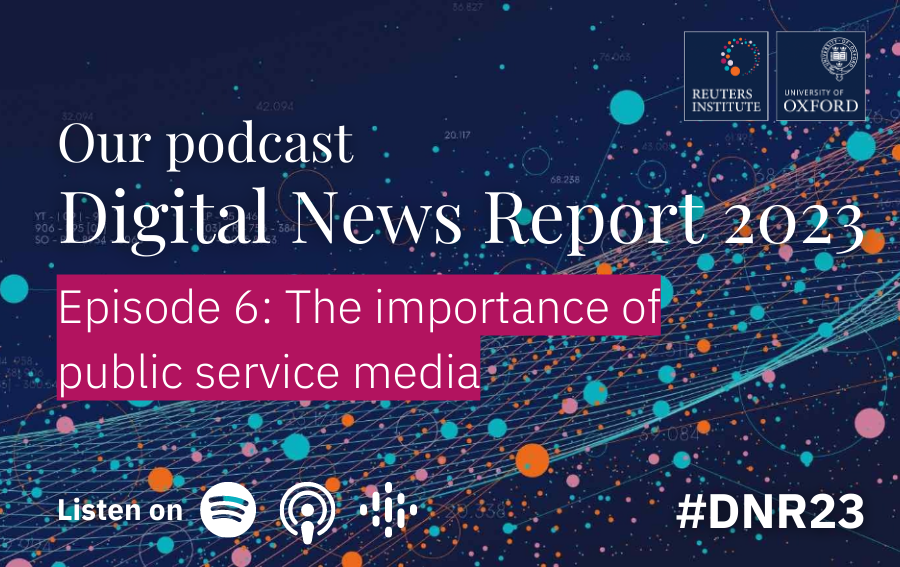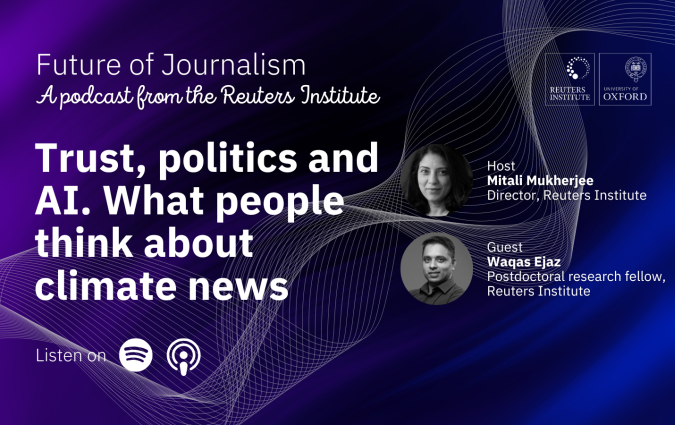Our podcast: Digital News Report 2023. Episode 6: The importance of public service media for individuals and for society

In this episode of our Digital News Report 2023 podcast we look at how important news audiences feel public service media is, both for themselves and wider society. We explore how this correlates with use of public service media and other news media, as well as other factors like age and education.
Speakers
Richard Fletcher is Director of Research at the Reuters Institute. He is primarily interested in global trends in digital news consumption, comparative media research, the use of social media by journalists and news organisations, and more broadly, the relationship between technology and journalism. He is the author of a Digital News Report chapter on attitudes towards the importance of public service media.
Our host Federica Cherubini is Director of Leadership Development at the Reuters Institute. She is an expert in newsroom operations and organisational change, with more than ten years of experience spanning major publishers, research institutes and editorial networks around the world.
The podcast
The transcript
Public and private importance | Correlation with usage | The 'crowding out' effect | Proving PSM's importance
Federica: So can we just start again with sort of like setting the scene and can you help us explain what is a public service media and how their remit differs from other news organisations?
Richard: Well public service media vary a lot even within Europe but I think the thing that really sort of ties most of them together is a clear public service mission. Part of that mission is to serve or try to serve all of the public. Of course some commercial media organisations may aspire to do this too but it's not really part of a remit in the same way. I think public service media is important because and it's important therefore to understand what people think about public service media because often they constitute the biggest state intervention in the media market. So in most Western and Northern European countries public service media are also the most widely used sources of news if we take online and offline use together. So they're big important parts of media systems and often used as a key factor for identifying and categorising the structure of the media in different countries.
Public and private importance ↑
Federica: So the central aim of this specific chapter of the report was to understand how important news audiences feel public service media are to them and to society in general. How did you measure this and overall what did you find?
Richard: Well there's lots of ways to analyse public service media and this is just one of them but we think it's a particularly useful way of doing it. So we documented how important citizens feel the news side of what public service media do is, firstly for them personally and then secondly for society. We asked these two questions in 19 countries in our survey and these are countries which have relatively well-funded, relatively independent public service media and when we look at the data from these countries we can see that most people or more people I should say say that public service media are important than say public service media is unimportant. So there's a net positive opinion if I can put it that way when it comes to news. In some countries the positive view is much more widespread than it is in others so if we look, for example, at the Nordic countries we see particularly high levels of people saying that news from public service media is important for them personally and to society. In Germany, in the UK, it's a bit less widespread and there is a significant minority of around 20 to 25%who say that public service media news is unimportant to them and to society. So the positive view is far from universal but in most of the countries we look at there is a net positive view. And finally I think the other interesting point is that in pretty much every country we see slightly higher numbers of people saying that public service media news is important for society as compared to important for them personally. The figures are pretty similar but normally slightly higher for societal importance.
Federica: So stay on this finding that suggests more people feel public service media are more important for society than for themselves that are important for themselves. Why is that?
Richard: I think it's not completely clear from the data we have but it does, you're right, it does seem that the public value is often clearer to people than the private value if I can put it that way. And it's clear that some people see public service media as something that is perhaps good for other people to have or good for society in general. People might for example think, “Well I'm not particularly worried about my own news consumption, I'm happy with that, but I'm perhaps worried about whether other people are getting enough news,” and they perhaps see public service media as important for society in that regard.
Correlation with usage and other factors ↑
Federica: So how does the audience’s perceived value of public media correlate with the actual self-reported use of public media organisations?
Richard: Yes we looked at the data and we're interested in what variables and what sort of factors are associated with thinking that public service media news is important. And you're right that one of the best predictors that we found was actually using public service media news regularly. So the more people use public service media news the more likely they are to think that it's important both for themselves but interestingly also for society as well. Other variables that we might think are important like education and political leaning they matter too. But news use from public service media does seem to be particularly important. Other factors like age at first they sort of look like they're predicting thinking that public service media is important but when you control for things like public service media news use the differences by age disappear. So in other words it's true that older people are more likely to think that public service media are important but this is probably just because they also use public service media news more. So it seems primarily about use.
The 'crowding out' effect ↑
Federica: One of the criticisms levelled at public service media by their detractors is that they crowd out other news media, that they create an uneven playing field. Could you explain whether this phenomenon actually exists and also what you found out about from our survey around how attitudes towards public service media correlate with use of other news brands?
Richard: It's a really complicated issue because public service media works quite differently in different countries so it's hard to have a consistent view. And it's also complicated partly because it relies on a big counterfactual so it's very difficult to really know what the news media would be like without public service media because it's been around for such a long time. That being said I personally haven't seen any strong evidence of the crowding out arguments and there are even some studies that suggest the opposite effect. So if we think about it at a very basic level you can see that countries with the highest levels of payment for online news for example are often countries with very large well-funded and widely used public service media. In our data from this year we can see that people who think that public service media is important are actually slightly more likely to use commercial news media as well than people who think it's unimportant. And previously in other studies we found that public service media news users also tend to be heavy users of commercial news media. Of course this is all cross-sectional and I'm not suggesting any kind of causal relationship between the two but I think it just highlights how the crowding out issue isn't as straightforward as we might think.
Proving PSM's importance ↑
Federica: Given what you've learned from this research, what do you think public service media should think about trying to convince more people about their importance?
Richard: I think they can demonstrate that in a number of ways but I think the sort of key point from this piece of research is that it highlights the importance of actually using public service media news and how important that is for the public connection and why it's important for public service media to try and reach as much of society as they can in order to maintain that connection. And I think on top of that it perhaps also suggests that if public service media were instead given what we might call a market failure remit, so the focus would be on filling the gaps left by commercial media because it's not profitable or they don't do it for other reasons, then if they adopted that kind of remit or were given that kind of remit then I think we might expect that also to weaken the public connection. So I think again it highlights how important use is for value in public service media.
Federica: Thank you so much for joining us today Richard.







